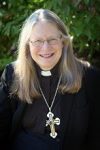Editor’s note: This year the ELCA celebrates 50 years of Lutheran women’s ordination in the United States, 40 years of the ordination of Lutheran women of color and 10 years of Lutheran LGBTQIA+ individuals’ freedom to serve (elca.org/50yearsofordainedwomen). In this eight-part series, these leaders share their joys, struggles and gospel hope.
Deep down I always knew I wanted to go into some kind of ministry. With my early and deep involvement in the church, this desire was natural. And who was the most visible minister? The pastor. But there was a problem when I was growing up: only men could be pastors.
So that sense of call stayed buried until a confirmation teacher, attempting to show us kids that we were all called by God, encouraged us to reveal how we felt called. I fell for it and voted for “pastor.” My teacher tried to put the genie back in the bottle, but it was too late. The words had been spoken. They were no longer buried.
I kept my options open, majoring in English as an undergraduate, then receiving a North American Theological Fellowship to try out seminary for a year—all expenses paid, no strings attached. I chose Harvard Divinity School, in part because it had a history of educating both women and men for ordained ministry, and because it had some women on the faculty. Paradoxically, being at Harvard, surrounded by ecumenical and interfaith colleagues, I began to feel more at home with imagining myself as a Lutheran pastor.
As I tried on an alb, I noticed two Catholic seminarians also trying them on and realized that I was much more comfortable in a long dress than they were.
I stayed and earned my Master of Divinity degree. I went through the candidacy process in my synod. I was approved and received a call. At the synod assembly, I was the only woman in a group of a dozen or so ordinands.
I can’t say there was universal support for me. My husband, family and friends were solidly behind me, but I experienced pushback from the right (“If God had wanted women to be ministers, he would have made them men”) and the left (“Why in the world would you want to waste your talent and potential for a dead-end career in the church, of all things?”).
Oddly, one event that solidified my sense of call took place at a Catholic supply store in Boston. As I tried on an alb, I noticed two Catholic seminarians also trying them on and realized that I was much more comfortable in a long dress than they were.
Embracing the challenge
I identify with the story of Samuel and Eli, in which both mistake God’s call to Samuel at first. In the end, it takes Eli to make the astounding suggestion: “Yes, Samuel, you are being called. And it’s the Almighty” (based on 1 Samuel 3). Sometimes it takes a village to identify a call. Sometimes it takes an interpreter. Sometimes it takes someone screening out the ambient noise. Sometimes it takes listening in a different frequency.
Gender has always been an issue in my ministry, and I have embraced the challenge. It is part of who I am. Whether as a campus pastor, parish pastor, continuing education director or bishop, for so many people I have been their “first.” They would ask, “What is it like to be a woman in ministry?” I’d answer, “I don’t really know. I’ve only ever been a woman in ministry.”
And yes, I have experienced discrimination based on gender, both explicit (“We don’t want a woman!”) and more subtle (“We worry that you would not be able to tend to your family and the congregation simultaneously”).
They would ask, “What is it like to be a woman in ministry?” I’d answer, “I don’t really know. I’ve only ever been a woman in ministry.”
Our children, now 35 and 31, have no memory of me as a parish pastor. By the time they could recall, I was doing church administration and a lot of supply preaching. They considered sitting in a pew with their father a normal thing. And they were accustomed to theological conversations with visiting scholars around the dinner table.
My daughter, now a Hebrew Bible scholar, comments that because of those dinner table conversations, she and her brother didn’t face the same kind of faith crises upon reaching college as many do. “I would not be a feminist biblical scholar without you,” she wrote me recently. As she faces being a minority in her field, she also draws strength from knowing the challenges I have faced.
Our son, who, like his father, became an attorney, grew up never thinking twice about strong women in leadership positions—the professors, judges and government officials who are his mentors and role models. “To me, your professional leadership was a natural extension of your leadership in our family: obvious, natural, and a good thing for all those who came across it,” he wrote me recently.
Growing up in a home with supportive parents who did not enforce traditional gender roles has benefited both our children.
I am grateful to be part of this journey, responding to God’s call, proclaiming, reforming, celebrating. As Hannah proclaimed when she left Samuel in the temple, “My heart exults in the Lord; my strength is exalted in my God” (1 Samuel 2:1).
Thanks be to God! The church is richer with women in leadership.




